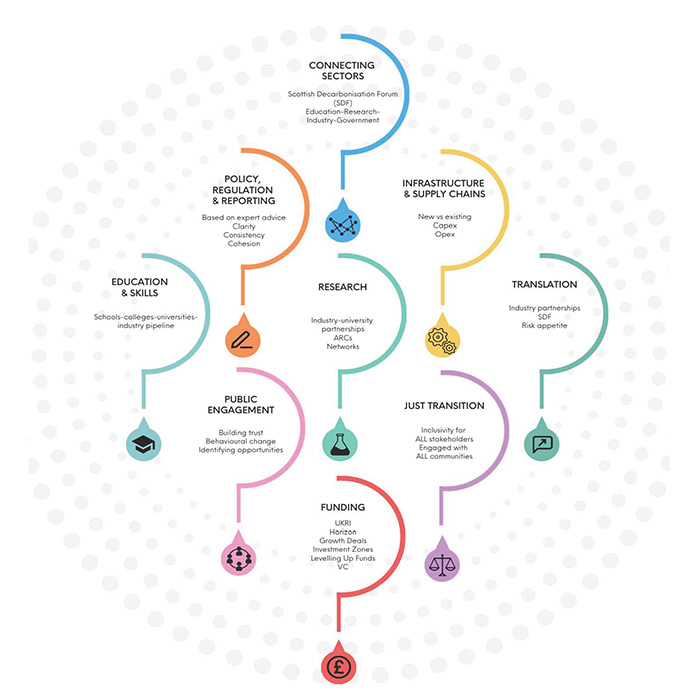Easy and FREE way to teach and learn molecular docking from scratch!
Standalone set of training materials for postgraduate students or adapt it to be part of a course.
If you download and use these resources, please acknowledge ScotCHEM.
Easy and FREE way to teach and learn molecular docking from scratch!
Standalone set of training materials for postgraduate students or adapt it to be part of a course.
If you download and use these resources, please acknowledge ScotCHEM.
The Henry Royce Institute for Advanced Materials has appointed an expert team comprising ScotCHEM, Perspective Economics and Urban Foresight to engage stakeholders across the materials science community in the development of a new National Materials Innovation Strategy.
ScotCHEM is the project lead and, with the team, will expand on the Framework for the strategy, working across the research community to develop both the econometric data and the wider underpinning evidence necessary for scoping, definition and appropriate groupings of:
The project team will work under the direction of the new Materials Innovation Leadership Group, which has been established by Royce to oversee and champion the development of this important new Strategy that will tackle the major challenges and opportunities that lie ahead for the UK.
Development of the Strategy will run from now until the end of 2024, with the first stakeholder workshops being planned for later this year.
Materials underpin manufacturing, and the UK is one of the largest global manufacturing nations, contributing £203 billion every year to GVA and supporting 5 million jobs. 84% of this manufacturing takes place outside of London and the South East.
We look forward to working with industry, government, academia and the 3rd sector to develop this significant strategy for the UK.
For enquiries, please contact [email protected]
Keep up to date with the Strategy development – sign up to the Henry Royce Institute Newsletter
In May this year, we brought together key stakeholders from industry, academia, government and the NGO sector to identify key barriers to the decarbonisation of the chemical industries, and potential solutions to those barriers.

ScotCHEM is now working with various partners to drive outcomes from the meeting.
ScotCHEM was pleased to partner with RIS, KTN, ETP and SRPe to deliver the 3rd workshop in the series: Just Transition to a Net Zero Carbon Society. The report from the workshop can be accessed from the RIS website, together with the reports from workshops one and two.

We are delighted to be one of the consortia selected to deliver the SFC Saltire Emerging Researcher Scheme European Exchange programmes.
Enabling ScotCHEM researchers to collaborate with colleagues in EU Member States, and EEA and EFTA countries will bring benefits not only to individual researchers and their research groups but also to Scotland’s research ecosystem. Growing relationships and attracting talent to Scotland is a key aim of the scheme.
ScotCHEM hosted a webinar to answer questions from the community in relation to the SFC Saltire Emerging Researcher Scheme: ScotCHEM European Exchanges call on Tuesday 19th October 2021 2pm (immediately following the ScotCHEM ECR Seminar).
Applications for the ScotCHEM Saltire European Exchange Programme are now closed.
Application deadline: 28 January 2022.
[Last updated: 25 February 2022]
Applications deadline: 5pm on December 18th 2020
For the last few years ScotCHEM and the SFC have been supporting early career researcher (ECRs) through the PEER and PECRE funds. Due to recent events surrounding the COVID-19 pandemic the remit of these calls seems less appropriate as travel restrictions continue to be very unpredictable. Therefore, ScotCHEM is pleased to open a funding call for ECRs with as much flexibility as possible.
The funding call will be split between two types of applicants and awards, non-independent and independent ECRs (see eligibility criteria below).
Non-independent ECRs can apply for up to £500 while independent ECRs can apply for up to £4000. A minimum of 8 projects will be funded for non-independent researchers and a minimum of 4 projects will be funded for independent researchers.
The project proposal must highlight how it will have a positive impact on the lead applicant’s career and must also fulfil at least one of the following aims:
Submit your applications to [email protected]
Applications deadline: 5pm on December 18th 2020
Enquiries should be directed at Dr Alan Wiles (Director of Operations ScotCHEM) [email protected]

The Lightweight Manufacturing Centre in Renfrew is a new part of the Scottish Government’s National Manufacturing Institute Scotland (NMIS). It will focus on the manufacture of lightweight components for a range of industries in which lighter materials offer benefits, including, aerospace, automotive, oil and gas, renewables, medical, marine and off-highway transport. It will deliver cutting-edge research and development projects involving lightweight materials in partnership with companies in Scotland
The LMC team have suggested the items below for special consideration.
Please email feedback to [email protected].
In your message please consider including: